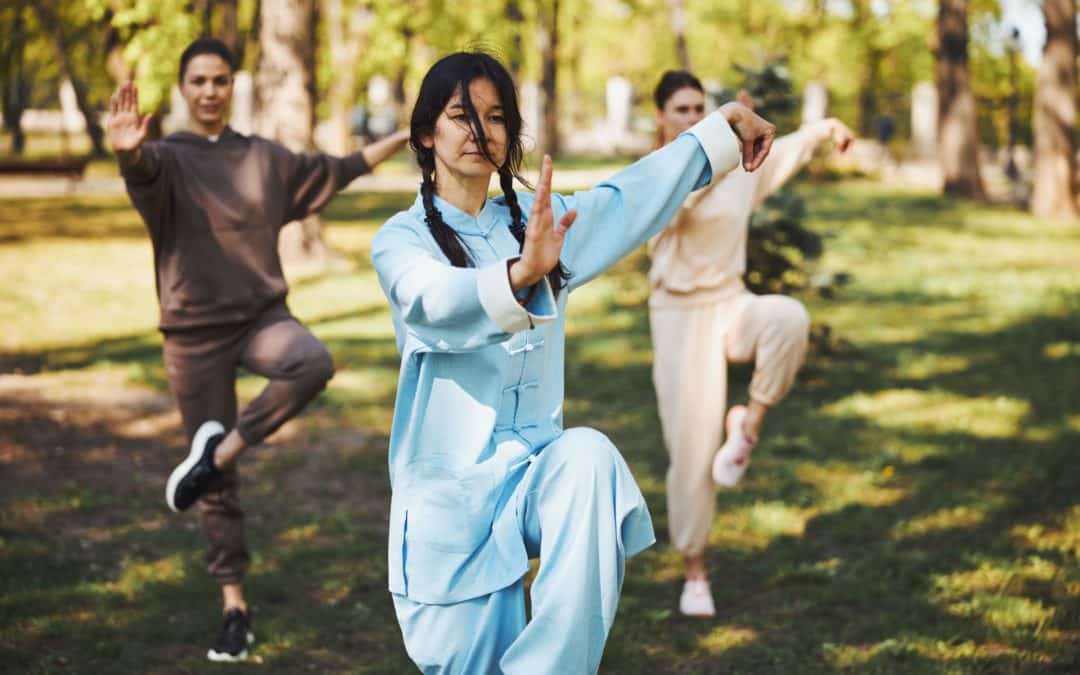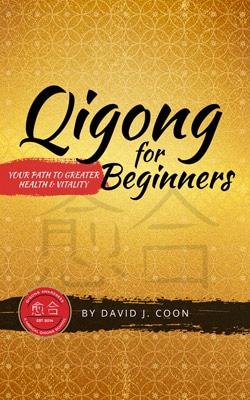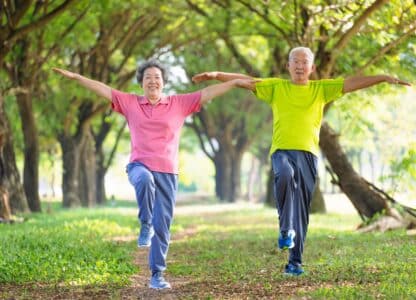Flexibility is key to a strong, healthy body. Whether we exercise regularly or lead a mostly sedentary lifestyle, our muscles and joints like to stiffen up, which can cause aches or make us prone to injury. Improving flexibility allows for more sustainable exercise and helps remedy any tension we may have built without being aware of it. A runner, for example, may have tight quad, hamstrings, and calf muscles, and stretching them is vital for making sure they stay strong and mobile. Or if you spend lots of time looking at your computer screen, your back may be used to hunching over—some simple stretches can counteract that posture. In this post, we talk about how Qigong helps with flexibility, and the benefits of regular Qigong for a more mobile body.
Will Qigong make me more flexible? What is flexibility?
When we hear the word flexibility, many of us picture a gymnast doing the splits, or a Gumby-like leg-lift over the head. But at its most basic form, flexibility is about being able to lengthen and extend your muscles. A holistic exercise that incorporates mind, body, breath, and movement, Qigong works to increase the body’s flexibility gradually. Rather than holding deep stretches or postures for a long period of time, Qigong focuses on gentle, simple movements that allow you to work your way up to a more flexible state, little by little. This might mean one day you are able to reach your arms higher than you could the day before, or to get a little bit closer to reaching your toes. These incremental changes help train your body to build a long-lasting foundation open to muscle extension.
Qigong also helps increase mobility, which is related to flexibility. Though they are similar, mobility refers to your body’s range of motion, rather than how far your muscles extend. Designed to increase fluidity in the joints through coordinated breathing and repetition of movements, Qigong helps increase range of motion in your arms, legs, hips, and shoulders. Qigong also warms up the body internally by increasing circulation in the body, which allows you to be more flexible as you move.
What are the benefits of practicing flexibility and mobility through Qigong?
Working on flexibility and mobility through Qigong practice helps alleviate muscle soreness, body tension, and general aches. Because it is a low-impact exercise, Qigong also aids in the prevention of injuries, such as joint pain or back problems. When you practice, you might find yourself in unexpected movements or strange postures you’re not used to. It might feel funny at first, but these exercises work to counterbalance stress in your body, reintroducing fluidity into your joints, connective tissues, and muscles. As an exercise that focuses on equilibrium, Qigong also helps regulate the nervous system, which is directly tied to our body’s openness to flexibility and range of motion. Below are some more specific examples of these benefits.
Improved Posture and Alignment
Regular Qigong practice helps achieve better posture. Many of us hunch as we read or look at screens, and over time, our bodies get used to forming that particular shape. You could say that our nervous system, muscles, and tissues are all prepared to make that posture at a moment’s notice, especially if that posture is a regular habit. But as you may have experienced, we tend to carry a lot of tension in our neck and shoulders, and too much hunching can lead to stiffness and strain. Qigong exercises work to actively elongate the spine, neck, and shoulders, bringing increased circulation to those areas so that there is minimized pain and improved alignment.
Alleviation of Arthritis and Joint Pain
The gentle movements of Qigong can greatly help symptoms of joint pain and even prevent arthritis as we age. As we get older, our bodies grow stiffer and less pliant. It is a natural part of life, but in some instances, this stiffness can lead to great discomfort. Because Qigong focuses on increasing range of motion—or the movements your joints can make—it helps keep the joints fluid and mobile. This mobility helps to alleviate joint strain and keeps the body healthy and strong as it ages.
Injury Prevention
Overall, Qigong exercise works not only to treat stiffness but to prevent further injury in the future. Stretching helps work out kinks or tight muscles, preparing the body for higher-impact exercises. Additionally, Qigong exercises assist in the improvement of balance and coordination, which helps minimize the risks of injury from accidents. In one scientific study, adults ages 51 to 96 practiced Qigong regularly over a 12 week span. Results showed that they came away with improved balance and gait, thus leading to less risk of falling and injury. It also helped with confidence and overall health.
What is a good Qigong routine for improving flexibility and mobility?
A great place to start would be Waterfall. This simple exercise consists of a shoulder width or wider stance and synchronized breathing with the rise and fall of your arms. It is a fundamental breathing and movement exercise that we recommend for beginning Qigong practitioners as well as those who have been practicing a long time.
Qigong helps flexibility and mobility by allowing our bodies the space to ease into expanded movement. A simple 5 to 10 minutes a day will have a lasting impact on your body and will help you get into the rhythm of a consistent habit. The goal is to stretch and increase our range of motion gradually each day. This way, we work on our flexibility from the inside out for long-lasting benefits.
David’s Video: Qigong for Flexibility and Mobility







